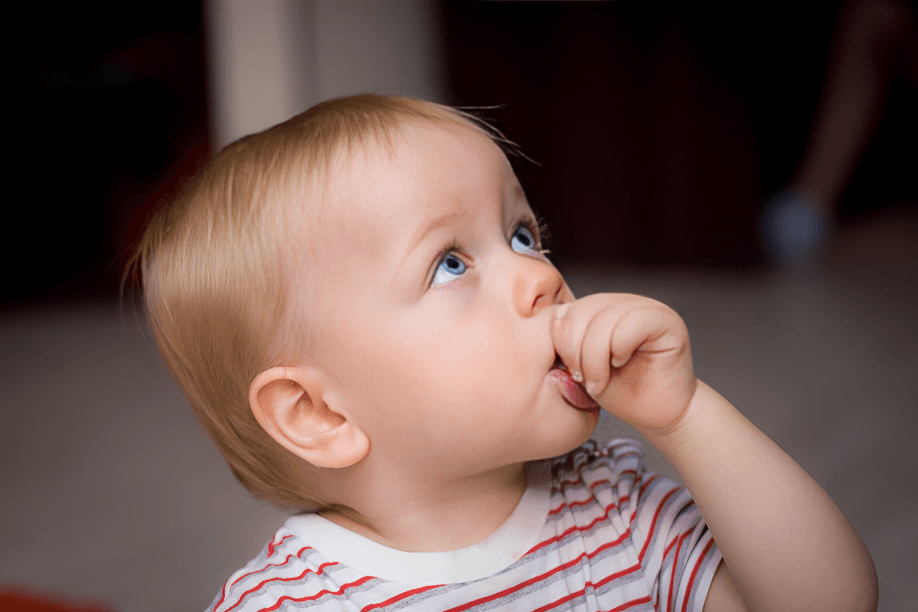
“
Preventing and treating childhood dental problems is crucial for a child’s long-term oral health. Many issues in adulthood begin during childhood due to neglected hygiene, sugary diets, and skipped dental checkups. Addressing concerns early with proper brushing, regular dentist visits, and good eating habits helps build strong, healthy teeth for life. 1
1
”
Children’s teeth are softer than adult teeth, making them more vulnerable to cavities from sugary snacks, sticky foods, and acidic drinks that weaken enamel and encourage bacteria to grow. 1
The first dental visit should happen by age one or when the first tooth appears, helping dentists monitor early development and teach parents how to prevent decay before problems start. 2
Fluoride strengthens tooth enamel by making it more resistant to acids. Using fluoride toothpaste twice a day significantly lowers the chances of cavities in both baby and permanent teeth. 3

Thumb sucking past age four can push upper teeth forward and affect jaw growth. Dentists often recommend gentle reminders or mouth appliances to help children stop this habit early.
Bottle-feeding at bedtime with milk or juice leaves sugar on the teeth overnight. This promotes bacteria growth and leads to baby bottle tooth decay, especially in the upper front teeth. 4
Dental sealants are protective coatings applied to the chewing surfaces of back teeth. They act as barriers against plaque and food, reducing the risk of decay in cavity-prone areas. 5
A balanced diet with calcium-rich foods like cheese, yogurt, and green vegetables supports strong teeth and bones, while sugary and acidic snacks increase the risk of enamel erosion. 6
Regular brushing for two minutes, twice a day, with a child-sized toothbrush ensures that all tooth surfaces are cleaned, helping reduce plaque buildup and prevent gum disease. 7
Cavity-causing bacteria can spread from caregivers to children through shared utensils or kisses, making parental oral hygiene equally important for preventing early childhood caries. 8

Teaching children to floss daily helps remove plaque from between teeth, where toothbrushes can’t reach. Starting this habit early encourages lifelong gum health and cleaner smiles.
Dental X-rays in childhood are safe and essential. They help identify hidden decay, monitor jaw development, and ensure permanent teeth are coming in properly behind baby teeth. 9
Mouthguards protect teeth during sports activities. Custom-fitted ones offer better comfort and protection, reducing the risk of chipped or knocked-out teeth from accidental trauma. 10
Cavities in baby teeth can cause pain, infection, and trouble eating or speaking. Treating them promptly helps prevent complications and supports proper growth of adult teeth underneath. 11
Sugary medications like syrups can harm teeth if used often. Rinsing the mouth with water afterward or choosing sugar-free alternatives helps protect children’s enamel from decay. 12
Genetics can affect cavity risk and tooth strength. However, daily oral care and regular checkups can overcome most inherited challenges and keep teeth healthy regardless of DNA. 13
Gums should be cleaned even before the first tooth erupts. Wiping with a soft cloth removes bacteria and prepares the child for brushing once teeth begin to appear. 14

Orthodontic problems like overcrowding and misaligned bites are easier to treat in childhood. Early intervention may prevent complex treatments later and guide teeth into better positions.
Using an electric toothbrush can help children with poor motor skills clean more effectively. Some models have timers and lights to guide proper brushing habits. 15
Dentist-recommended chewable toothbrushes can introduce toddlers to brushing. They're gentle on gums and help establish comfort with daily oral routines from a very young age. 16
The renowned philosopher and physician Avicenna noted that oral hygiene was essential for overall health, linking ancient wisdom to today’s science in preventing childhood dental problems.17


